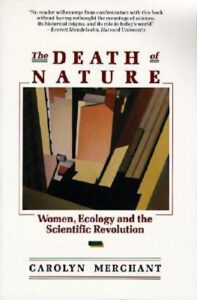The earth, as mother nature, has a living being. If we look into the past, it is evident that since the world was established, man has given great importance to it along with his existence. Mountains, rivers, forests, and canals are considered part of their existence; their protection has been done like the protection of human life because man is alive with nature and rich in the treasures of health. The ancient past recognized the fact that every soul depends on nature. But with the passage of time, this view continued to change, and a severe scientific revolution began to take place, which began to see nature as a machine. Before that, nature was portrayed as a mother who nurtured like a mother and was endowed with feminine and all-life-giving qualities.
In 1980, Carolyn Merchant wrote “The Death of Nature” in the field of environmental science fiction. By writing, it caused a stir, and a modern type of literary storm began to take place in world literature, especially in science fiction, which had a profound effect on the field because this genre has always been associated with a deep connection between the natural world and humanity. This groundbreaking work sparked academic debates in various fields of ecology and the Scientific Revolution.
Nature’s transformation from organism to machine:The scientific revolution fundamentally changed the way nature was viewed, and during this time, scientists and thinkers began to see nature as a machine, a machine over which man had complete control over various parts.
Shifting metaphors:
Merchant analyses the changing trends of the Scientific Revolution in the 16th and 17th centuries, how metaphors for nature changed during this period, and how nature was likened to a machine that desperately needed to be controlled.
Outcomes of the shift:
Merchant argues that the scientific revolution had negative effects on both the environment and society globally, due to which humans have become disconnected from the natural world and society has become a victim of environmental degradation and social inequality. The one who has alienated man from nature is now in need of science. The use of natural resources is very important for various fields of life, which man has lost in this revolutionary era. However the rise of mechanistic science and the evolving industrial framework gave rise to a new perspective. Nature had become a passive resource that deserved respect instead of control and exploitation.
Science Fiction’s Echo Chamber:
The science fiction writers of Echo Chamber were greatly influenced by Merchant’s ideas.Additionally, Merchant’s work has reexamined the human-nature relationship within science fiction. His ideas were quickly observed, and modern debates on the subject began. Thanks to Merchant’s theory, science fiction explored the future and the consequences of disconnection from the natural world. provided fertile ground for science fiction.
Tragic Dreams:
Works like Margaret Atwood’s The Handmaid’s Story and Octavia Head’s Anecdote of the Sower portray horrendous fates where natural breakdown has prompted social breakdown and abuse. These accounts act as wake-up calls, extrapolating the rationale of unrestrained ecological abuse to its bleak decision.
Ecological Activism: Then again, various sci-fi stories investigate elective ways ahead, where mankind figures out how to reside as one with nature. Ursula K. Le Guin’s The Left Hand of Murkiness and Kim Stanley Robinson’s Service for the Future propose proposition diagrams for maintainable social orders that focus on biological prosperity.
Post humanism and Beyond:
Merchant’s analysis can also be attributed to the central theme of contemporary science fiction, which is the blurring of human and technological boundaries. Her work features the equals between the generalisation of nature and the oppression of women, the two of which are tested by post humanist stories that imagine more liquid and interconnected connections between people, nature, and innovation.
Beyond Western Walls,Intersectional Critiques of Merchant’s Work:
His work has unquestionably left a lasting impression on environmental science fiction, its limitations must be acknowledged. Her analysis has been criticised for focusing primarily on the Western European experience and ignoring the many different points of view of indigenous cultures and communities of colour, who have long fought against the dominant idea of nature as a passive resource.
Moreover, Merchant’s accentuation on the gendered aspects of ecological corruption has been investigated for disregarding the complicated interchange of race, class, and other social variables. Therefore, contemporary ecofeminist sci-fi authors are participating in nuanced studies and reimaginings of Merchant’s structure, consolidating diverse viewpoints to make more comprehensive and multi-layered accounts.
A Tradition of Change:
Notwithstanding its weaknesses, The Death of Nature remains an original work that keeps on forming the discussion about humankind’s relationship with the regular world. Its effect on sci-fi is unquestionable, provoking the class to defy the environmental outcomes of our activities and imagine elective fates where people and nature can coincide as one. As we face the genuine difficulties of environmental change and ecological corruption, Merchant’s work fills in as a strong sign of the requirement for extremist changes in context and a re-visitation of a more deferential and equal relationship with the Earth.
Conclusion:
If examined from all aspects,Carolyn Merchant’s “The Death of Nature”has significantly influenced all sci-fi writers in exploring the environmental perspective, each thinking and understanding differently than before. His work has opened up new avenues for critical engagement and imaginative world-building by challenging the prevalent view of nature as a passive resource and highlighting the gendered aspects of environmental degradation. As we wrestle with the environmental emergency within recent memory, sci-fi, informed by Merchant’s bits of knowledge, can keep on assuming a crucial role in imagining and eventually making a more economical future for all.


